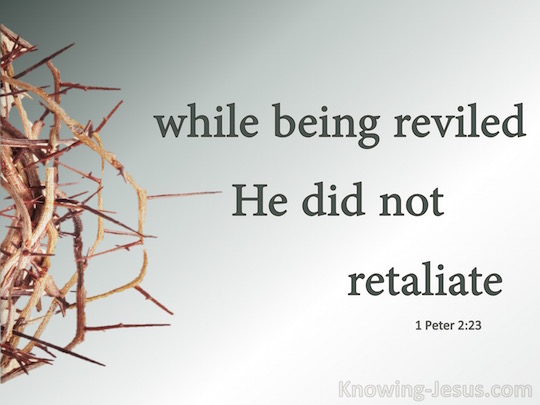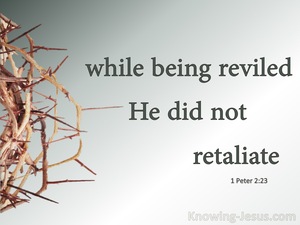Parallel Verses
Goodspeed New Testament
He was abused but he did not retort. He suffered but he did not threaten, but committed his case to him who judges justly.
New American Standard Bible
King James Version
Who, when he was reviled, reviled not again; when he suffered, he threatened not; but committed himself to him that judgeth righteously:
Holman Bible
He did not revile in return;
when He was suffering,
He did not threaten
but entrusted Himself to the One who judges
International Standard Version
When he was insulted, he did not retaliate. When he suffered, he did not threaten. It was his habit to commit the matter to the one who judges fairly.
A Conservative Version
Who, being reviled, did not revile in return. Suffering, he did not threaten, but yielded to him who judges righteously.
American Standard Version
who, when he was reviled, reviled not again; when he suffered threatened not; but committed himself to him that judgeth righteously:
Amplified
While being reviled and insulted, He did not revile or insult in return; while suffering, He made no threats [of vengeance], but kept entrusting Himself to Him who judges fairly.
An Understandable Version
When He was spoken to with harsh insults, He did not reply in the same way. When He was made to suffer, He did not threaten [His tormentors], but instead entrusted Himself to God, [whom He knew] would make a righteous judgment [in the matter].
Anderson New Testament
When he was reviled, he did not revile again; when he suffered, he did not threaten, but committed himself to him that judges righteously.
Bible in Basic English
To sharp words he gave no sharp answer; when he was undergoing pain, no angry word came from his lips; but he put himself into the hands of the judge of righteousness:
Common New Testament
when he was reviled, he did not revile in return; when he suffered, he uttered no threats, but he trusted himself to him who judges justly.
Daniel Mace New Testament
who, when he was reviled, did not revile again: when he was in his sufferings, he did not threat, but referr'd his cause to the righteous judge.
Darby Translation
who, when reviled, reviled not again; when suffering, threatened not; but gave himself over into the hands of him who judges righteously;
Emphatic Diaglott Bible
who, when he was reviled, did not revile in return; when he suffered he did not threaten, but committed his cause to him who judges righteously-
Godbey New Testament
who, being reviled, reviled not again; suffering, he threatened not, but gave up to the one judging righteously:
John Wesley New Testament
Who when he was reviled, reviled not again, when he suffered he threatened not, but committed himself to him that judgeth righteously:
Julia Smith Translation
Who, being reviled, reviled not back; suffering, he threatened not; and delivered to him judging justly;
King James 2000
Who, when he was reviled, reviled not again; when he suffered, he threatened not; but committed himself to him that judges righteously:
Lexham Expanded Bible
who [when he] was reviled, did not revile in return; [when] suffering, he did not threaten, but entrusted [himself] to the one who judges justly,
Modern King James verseion
who when He was reviled did not revile in return. When He suffered, He did not threaten, but gave Himself up to Him who judges righteously.
Modern Spelling Tyndale-Coverdale
which when he was reviled, reviled not again: when he suffered, he threatened not: but committed the cause to him that judgeth righteously,
Moffatt New Testament
he was reviled and made no retort, he suffered and never threatened, but left everything to Him who judges justly;
Montgomery New Testament
He was reviled, and reviled not back. When he suffered he never threatened but always committed his cause to the One who judges rightly.
NET Bible
When he was maligned, he did not answer back; when he suffered, he threatened no retaliation, but committed himself to God who judges justly.
New Heart English Bible
Who, when he was cursed, did not curse back. When he suffered, did not threaten, but committed himself to him who judges righteously;
Noyes New Testament
who, when he was reviled, reviled not again; when he suffered did not threaten, but committed himself to him that judgeth righteously;
Sawyer New Testament
who being reviled reviled not, suffering threatened not, but committed himself to him that judges righteously,
The Emphasized Bible
Who, being reviled, was not reviling again, suffering, he was not threatening, but was making surrender unto him that judgeth righteously, -
Thomas Haweis New Testament
who, when reviled, reviled not again; when he suffered, he used no menaces; but referred himself to him who judgeth righteously:
Twentieth Century New Testament
He was abused, but he did not answer with abuse; he suffered, but he did not threaten; he entrusted himself to him whose judgments are just.
Webster
Who, when he was reviled, reviled not again; when he suffered, he threatened not; but committed himself to him that judgeth righteously:
Weymouth New Testament
When He was reviled, He did not answer with reviling; when He suffered He uttered no threats, but left His wrongs in the hands of the righteous Judge.
Williams New Testament
Although He was abused, He never retorted; although He continued to suffer, He never threatened, but committed His case to Him who judges justly.
World English Bible
Who, when he was cursed, didn't curse back. When he suffered, didn't threaten, but committed himself to him who judges righteously;
Worrell New Testament
Who, when reviled, reviled not again; when suffering, was not threatening, but committed Himself to Him Who judgeth righteously;
Worsley New Testament
who, when He was reviled, reviled not again; when He suffered, He threatened not; but committed Himself to Him that judgeth righteously.
Youngs Literal Translation
who being reviled -- was not reviling again, suffering -- was not threatening, and was committing himself to Him who is judging righteously,
Themes
Afflicted saints » Should imitate Christ
Christ » Mediator » Meekness of
Committal » Committal into God's hands
Christian conduct » Following the example of Christ
Christ, our example » Conformity to, required in » Suffering wrongfully
Examples » Jesus Christ being an example
God » Trust in » Committal into God's hands
Meekness » Examples of » Christ's
Meekness » Christ set an example of
Mocking » The persecutors of jesus mock him
Revenge » Christ an example of forbearing
Revenge » Jesus an example of forbearing
Reviling and reproaching » The conduct of Christ under
God, Righteousness Of » Christ committed his cause to
Topics
Interlinear
De
Paradidomi
References
Hastings
Word Count of 38 Translations in 1 Peter 2:23
Prayers for 1 Peter 2:23
Verse Info
Context Readings
Submission Of Slaves To Masters
22 He committed no sin, and deceit was never on his lips. 23 He was abused but he did not retort. He suffered but he did not threaten, but committed his case to him who judges justly. 24 He carried the burden of our sins in his own body on the cross, in order that we might die to sin and live for uprightness. By his wounds you have been healed.
Names
Cross References
Luke 23:46
Then Jesus gave a loud cry, and said, "Father, I intrust my spirit to your hands!" With these words he expired.
Hebrews 12:3
Think of the opposition that he encountered from those sinners against themselves, if you would not grow weary and faint-hearted.
Matthew 27:39-44
And the passers-by jeered at him, shaking their heads
Mark 14:60-61
Then the high priest got up and came forward into the center and asked Jesus, "Have you no answer to make? What about their evidence against you?"
Mark 15:29-32
And the passers-by jeered at him, shaking their heads and saying, "Aha! you who would tear down the sanctuary and build one in three days!
Luke 22:64-65
and they blindfolded him, and asked him, "Show that you are a prophet! Who was it that struck you?"
Luke 23:9
And he questioned him at some length, but he made him no answer.
Luke 23:34-39
And they divided up his clothes among them by drawing lots for them,
John 8:48-49
The Jews answered, "Are we not right in saying that you are a Samaritan and are possessed?"
John 19:9-11
and he went back into the governor's house and said to Jesus, "Where do you come from?" But Jesus made no answer.
Acts 4:29
And now, Lord, take note of their threats, and give your slaves the power to utter your message fearlessly,
Acts 7:59
As they stoned Stephen, he prayed, "Lord Jesus, receive my spirit!"
Acts 8:32-35
This was the passage of Scripture that he was reading: "Like a sheep he was led away to be slaughtered, And just as a lamb is dumb before its shearer, He does not open his mouth.
Acts 9:1
Now Saul, still breathing murderous threats against the Lord's disciples, went to the high priest,
Acts 17:31
since he has fixed a day on which he will justly judge the world through a man whom he has appointed, and whom he has guaranteed to all men by raising him from the dead."
Romans 2:5
But in your obstinacy and impenitence you are storing up wrath for yourself on the Day of Wrath, when the justice of God will burst forth.
Ephesians 6:9
You who are masters, too, must treat your slaves in the same way, and cease to threaten them, for you know that their Master and yours is in heaven, and that he will show no partiality.
2 Thessalonians 1:5
This is a proof of God's justice in judging, and it is to prove you worthy of the Kingdom of God, for the sake of which you are suffering,
2 Timothy 1:12
This is why I am suffering as I am, but I am not ashamed of it, for I know whom I have trusted and I am sure that he is able to guard what I have intrusted to him for that Day.
2 Timothy 4:8
Now the crown of uprightness awaits me, which the Lord, the upright judge, will award me on that Day, and not only me but also all who have loved and hoped for his appearing.
1 Peter 3:9
not returning evil for evil, or abuse for abuse. You must bless people instead. It is for this that you were called??o obtain blessing.
1 Peter 4:19
Therefore, those who suffer by the will of God must intrust their souls to a Creator who is faithful, and continue to do what is right.
Revelation 19:11
Then I saw heaven thrown open and there appeared a white horse. His rider was called Faithful and True, and he judges and wages war in uprightness.






